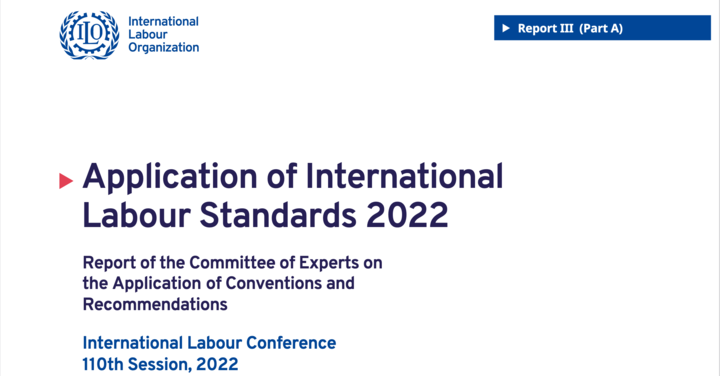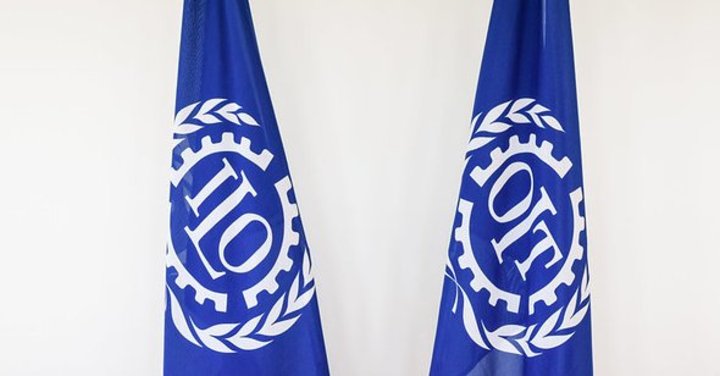Key Documents
- Committee on the Application of Standards (CAS)IOE Factsheet - July 2020
- Committee of Experts on the Application of Conventions and Recommendations (CEACR)IOE Factsheet - July 2020
- Committee Freedom of Association FactsheetJune 2019
- ILO supervisory system: Article 24 representation procedureIOE Factsheet - June 2020
What is the ILO Supervisory Mechanism?
International Labour Standards (ILS) adopted within the ILO are supported by a supervisory system to monitor and promote the proper implementation of ratified Conventions by Member States. ILS supervision comprises legal assessment, tripartite scrutiny and, where appropriate, direct contact with, and technical support to, Member States on the basis that optimal implementation will be achieved through dialogue, encouragement, advice and assistance.
Employers play a central role in supplying first-hand information for the legal evaluation and correction of cases of non-compliance. Central to this process are the ILO regular supervisory procedures undertaken by the Committee of Experts on the Application of Conventions and Recommendations (CEACR). This is a group of 20 legal experts from around the world, mandated to provide an impartial and technical, non-binding assesment of the application of ILS. They do this by examining governments’ reports to the ILO on the effect given, in law and practice, to the ratified Conventions, as well as the comments of employers’ and workers’ organisations on the reports, or on the implementation of a specific Convention. The CEACR issues observations (comments of a technical nature) on the application of a particular Convention, or direct requests, which seek clarifications or further information. A report of the observations submitted to governments is published annually in February/March and constitutes the basis for discussions at the International Labour Conference (ILC) the following year. The tripartite Conference Committee on the Application Standards (CAS) is appointed each year by the ILC to monitor on a tripartite basis the application of ILO standards. Its work is based on the CEACR’s reports, and involves drawing up a list of individual national cases for examination by ILO constituents. The government concerned is invited to respond orally before other Member States, employers and workers, who intervene in the CAS debate. In many cases, the CAS draws up conclusions recommending that governments take specific steps to remedy a problem or to invite ILO missions or technical assistance. The discussions and conclusions are published in the CAS report. Situations of special concern are highlighted in its General Report.
In addition to the CEACR and the CAS, any organisation of employers and/or workers may make a representation under Article 24 of the ILO Constitution to the ILO Governing Body (GB) against any Member State which it deems has failed to apply a ratified Convention. A tripartite committee may be set up by the GB to examine the representation and the government’s response. The committee then submits a report to the GB with the legal and practical aspects of the case, along with conclusions and recommendations. Where the government’s response is not considered satisfactory, the GB is entitled to publish the representation and the response. Also, under Article 26 of the ILO Constitution, any ILO Member State which has ratified a certain Convention, or a delegate to the ILC/GB, may lodge a complaint against a Member State for non-compliance with a Convention which both States have ratified. A Commission of Inquiry may be set up by the GB to carry out an investigation and make recommendations to address the problems raised. If these recommendations are not accepted, the matter may be brought to the International Court of Justice (ICJ). If the government fails to carry out the recommendations of the Commission of Inquiry or the ICJ, the GB may refer the case to the ILC. The Commission of Inquiry is the ILO’s highest-level investigative procedure; it is generally set up when a Member State is accused of persistent and serious violations which it has repeatedly refused to rectify.
Workers’ and employers’ organisations may lodge a complaint before the GB Committee on Freedom of Association (CFA) against Member States for violation of the principles of freedom of association as contained in the ILO Constitution, even if the State concerned has not ratified the relevant conventions (C. 87 and 98, for example). The CFA is composed of an independent chairperson and three representatives each of governments, employers, and workers. It receives the complaints and, after clarifying the facts with the government, submits a report to the GB containing conclusions and recommendations for action to the GB. Governments are subsequently requested to report on implementation of these recommendations. In cases where the country has ratified the relevant instruments, legislative aspects of the case may be referred to the CEACR. The CFA may also propose a “direct contacts” mission to the government concerned to address the problem directly with officials and the social partners through a process of dialogue.
Why is the ILO Supervisory Mechanism relevant to business?
This supervisory system aims to influence government action towards proper implementation of ratified Conventions. Because the CEACR’s comments, the conclusions of the CAS, and the recommendations resulting from one of the special supervisory procedures are addressed to governments, the immediate relevance for business may sometimes be underestimated. However, it is important to keep in mind that:
- ILS are implemented through national legislation which may directly affect businesses. Employers have to play a central role in the formulation and implementation of national regulations in compliace with ratified ILO Conventions.
- The supervision undertaken by the CEACR is based on the collection of relevant information through the governments’ reports and comments from employers’ and workers’ organisations. It is essential that employers’ organisations articulate the business perspective to the ILO so that the information is as complete and balanced as possible. The participation of employers may, for instance, give rise to recommendations to amend national legislation affecting business, or help to neutralise comments filed by trade unions.
- The CAS session is a main pillar of the supervisory system, and employers, with governments and workers, make a technical and political assessment of the application of ILO standards. Within the CAS, employers can publicly denounce alleged abuses and criticise unsatisfactory national policies. The attention on governments persistently ignoring their ILO obligations creates public pressure. Employer participation, including in drafting the conclusions, is therefore extremely influential.
- The representation and complaints procedures provide an opportunity for employers’ organisations to draw the attention of the GB to the failure by Member States to apply a ratified Convention. The representation is filed to obtain a tripartite recommendation to resolve the specific situation of non-compliance. The Commission of Inquiry set up following a complaint undertakes a first-hand investigation of alleged violations and is perceived as an alarm bell signaling very serious situations which may affect the business world.
- Through the procedure followed by the CFA, employers’ organisations can denounce attitudes of governments or laws which are hostile to employers, violate their freedom of association, or their rights as representative organisations. Furthermore, complaints are increasingly being submitted to the CFA by the unions with the clear intention of attacking and discrediting public or private companies (naming and shaming). In this scenario, the interest of employers’ organisations to provide the CFA with its views is even greater, especially if a company is cited.
What is the IOE’s position on the ILO Supervisory Mechanism?
ILS are important in building a proper social and business environment in an international context. A credible, balanced and well-functioning supervisory system, which takes into account the needs of sustainable enterprises, is key, as it also is in guiding ILO Member States in implementation efforts. The IOE acknowledges the valuable contribution of the supervisory machinery in addressing critical issues in labour relations and fundamental social rights. The IOE aims to achieve an ILS system which is transparent, realistic, balanced and credible and that it takes into account the diversity of legal frameworks, social, economic and technological developments and contexts and the needs of sustainable business.
The IOE is constantly working to address important inefficiencies in the ILO supervisory machinery and continues to work to influence the ILO system on issues essential to sustainable enterprises.
How does the IOE’s work on the ILO Supervisory Mechanism advance the agenda for business?
With official consultative status in the ILO, the IOE plays a key role by:
- Encouraging and assisting member organisations to input the supervisory mechanisms, in elaborating comments on the application in law and in practice of ratified Conventions; in preparing and guiding interventions during the CAS, including the negotiation of conclusions; in drafting complaints and representations, and freedom of association complaints, submitting comments/ complaints on behalf of, or jointly with, members;
- Engaging at GB level and with the ILO Office to improve the functioning and working methods of the supervisory bodies to make them transparent, efficient and relevant to the current needs of sustainable enterprises.
No upcoming events currently scheduled...








